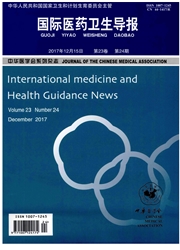

 中文摘要:
中文摘要:
目的了解顺德社区老年人轻度认知功能障碍(MCI)的患病率及其与饮食生活习惯的关系。方法采用随机整群分层分阶段抽样的方法对顺德容桂四个社区老年人进行现况调查。调查分为两个阶段:第一阶段为筛查,包括问卷调查及简易精神状况量表(MMSE)检查;第二阶段为临床诊断,对主诉或家属诉有明显记忆障碍者~MMSE分数低于界值者进一步行临床体格检查及临床痴呆分级量表(cDR)、总体衰退量表(GDs)、汉密尔顿抑郁评定量表(HAMD)、日常生活活动量表(ADL)、Hachinski缺血量表(HIS)等测验作出最后诊断。结果顺德社区老年人MCI患病率为7.33%。适量进食猪肉、牛羊肉及禽类、鱼、海鲜,经常喝茶,饮用牛奶,常吃禽蛋、水果,能显著降低老年人MCI患病率。结论顺德社区老年人认知功能损害的患病率较低,与顺德人喜欢吃鱼及海产品有关;大量进食肉类目前未发现与患病率存在负相关。
 英文摘要:
英文摘要:
Objective To investigate the prevalence of mild cognitive impairment( MCI ) among Shunde elderly people and the associated eating habit factors. Methods We adopted a random, cluster sampling method to investigate the elderly people aged 60 or above living in four communities of Shunde. The survey was separated in two stages. In the first stage, the visit to the subjects was performed to conduct general questionnaire and simple mental state examination ( MMSE ). In the second stage, for subjects with complaints or distinct cognitive impairments or dysmnesia and those with the scores less than the cut-off point of MMSE. The tests were conducted which included physical examine, Global Deterioration Scale, Hachinski Ischemic Scale, Hamilton Depression Scale, Clinical Dementia Rating, Activities of Daily Living Scale and neurological examination. The obtained dates were then ehi-square tested by means of SPSS 11.5 and analyzed through Logistic regression analysis. Results The rate of imparied cognition function in the communities of Shunde city was 7.33%. The factors exerting significant influence on the cognition impairment included eating sufficient pork, beef, chicken, fish, sea food, egg, milk, fruit and tea. Conclusion The rate of MCI among elderly people is on the lower level. Eating fish and sea food may be the potential factor. Eating great meats is uncorrelated to the prevalence at present.
 同期刊论文项目
同期刊论文项目
 同项目期刊论文
同项目期刊论文
 期刊信息
期刊信息
